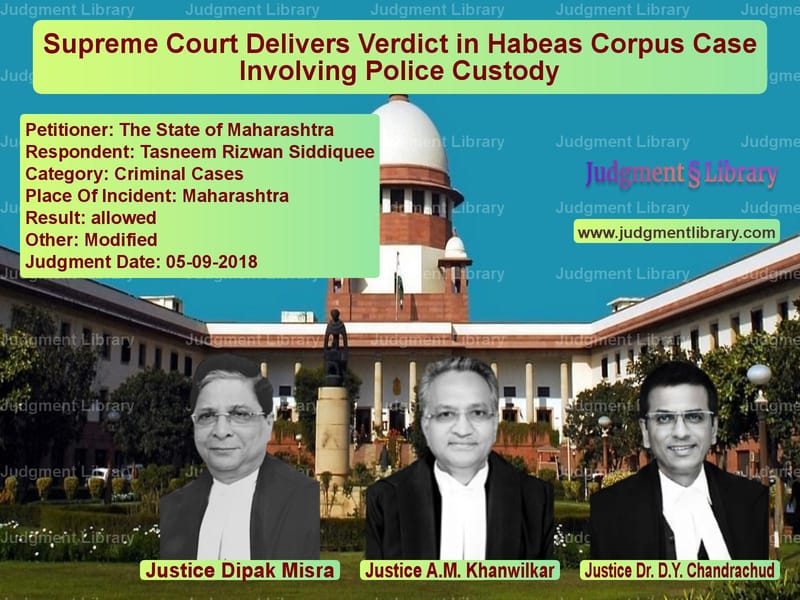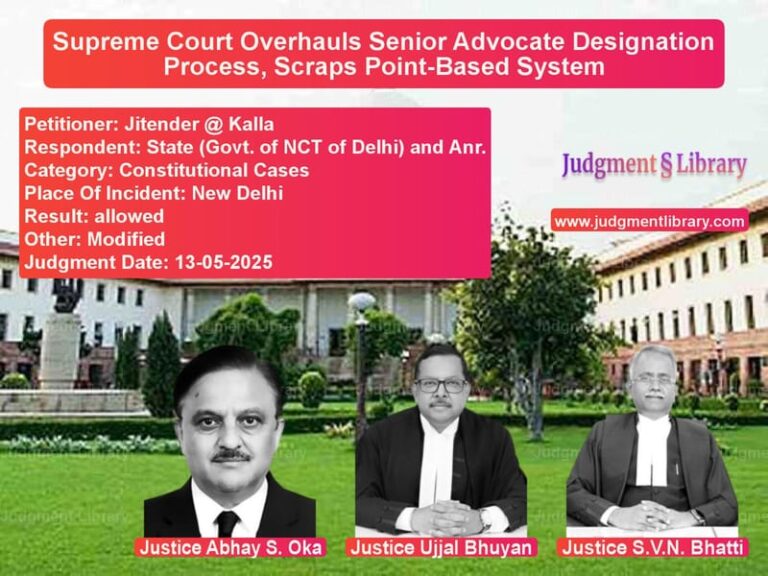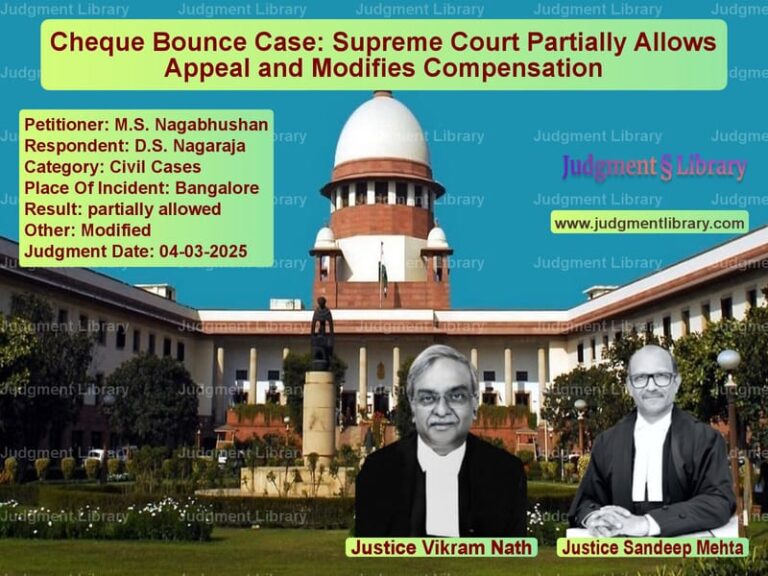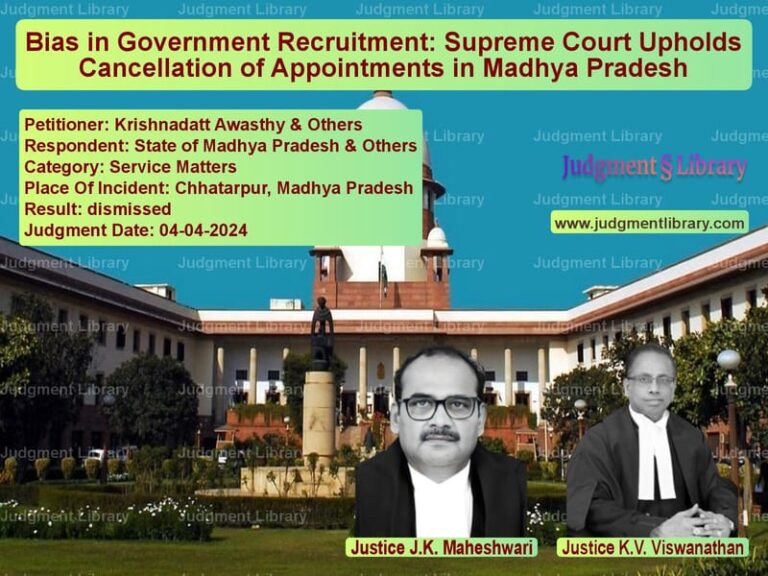Supreme Court Delivers Verdict in Habeas Corpus Case Involving Police Custody
The case of The State of Maharashtra v. Tasneem Rizwan Siddiquee involves a significant legal issue regarding the writ of habeas corpus and its application in cases where an individual is in police custody pursuant to a remand order by a Magistrate. The Supreme Court was asked to adjudicate whether a writ of habeas corpus could be issued in such circumstances, as well as to address the harsh remarks made by the High Court against the concerned police officers.
Background of the Case
The dispute originated from the arrest of Rizwan Alam Siddique, who was implicated in a criminal case involving the illegal procurement and sale of call data records. On 24th January 2018, a secret tip-off led to the arrest of Mukesh Pandian, a private detective involved in selling call data records. During the investigation, further evidence suggested that Rizwan Alam Siddique was connected to the crime, which led to his summons by the police.
Despite agreeing to appear before the police, Rizwan Alam Siddique failed to cooperate fully, leading to his arrest. The police arrested him on 16th March 2018, and he was remanded to police custody by a Magistrate until 23rd March 2018.
However, Tasneem Rizwan Siddiquee, the wife of Rizwan Alam Siddique, filed a writ petition before the High Court of Bombay, seeking the release of her husband on the grounds that he was illegally detained, thereby requesting a writ of habeas corpus. The High Court issued an order granting the writ of habeas corpus and directed the police to release the husband of the petitioner.
Legal Issues in the Appeal
- Whether a writ of habeas corpus could be issued in cases where the individual is in police custody due to a remand order passed by the Magistrate in a criminal case under investigation.
- Whether the High Court was justified in making scathing remarks against the police officers involved in the detention.
- Whether the police officers were legally bound to release the respondent based on the High Court’s ruling, despite the Magistrate’s order for police remand.
Arguments by the Appellants
The appellants, representing the State of Maharashtra and the police officials, argued that:
- A writ of habeas corpus could not be issued for someone in police custody under a Magistrate’s remand order as the detention was lawful and judicially sanctioned.
- The police acted within their legal boundaries, and the writ petition should be dismissed because the detention was in accordance with the law.
- The High Court’s observations against the police officers were unwarranted and should be expunged, as they were made without giving the officers an opportunity to present their side of the case.
Arguments by the Respondent
The respondent, Tasneem Rizwan Siddiquee, argued that:
- Her husband was illegally detained as the police had no valid grounds to continue his detention after the notice was served.
- While the police may have had initial grounds for his detention, their actions thereafter were unlawful, and he was entitled to be released based on the writ of habeas corpus.
- The High Court had correctly found that the detention violated fundamental rights and ordered his release accordingly.
Supreme Court’s Observations
The Supreme Court, after reviewing the case, made several important observations:
- The Court noted that the respondent’s husband was in police custody based on a Magistrate’s remand order, which made his detention legally sanctioned under the law.
- There is a well-established principle that a writ of habeas corpus cannot be used to challenge a lawful detention under a Magistrate’s remand order. The Court emphasized that habeas corpus is not meant for reviewing judicially sanctioned custody, which was the case here.
- The Court observed the inappropriate remarks made by the High Court regarding the police officials, noting that such comments should not have been made without affording the officers a chance to explain their actions.
The Court cited:
“In habeas corpus proceedings, the question before the court is not about the merits of the criminal investigation but whether the person is being illegally detained.”
Supreme Court’s Final Verdict
- The writ of habeas corpus was not applicable in this case because the respondent was in police custody under a lawful remand order passed by the Magistrate.
- The High Court’s decision to release the respondent was overturned by the Supreme Court, as there was no unlawful detention.
- The scathing remarks made by the High Court against the police officers were deemed unnecessary and were expunged from the judgment.
- The Supreme Court also directed that the police should proceed with the investigation in accordance with the law, and the respondent’s release had no bearing on the case.
“The detention of the respondent is lawful, and the order of the Magistrate granting police remand is binding. The observations made by the High Court are expunged, and the appeal is allowed accordingly.”
Conclusion
This case highlights the delicate balance between protecting an individual’s liberty through habeas corpus petitions and ensuring that law enforcement can conduct investigations within the boundaries of the law. The Supreme Court reaffirmed that habeas corpus cannot be used to challenge lawful detentions made under a Magistrate’s order, and that such petitions should be carefully examined. Additionally, the ruling addresses the necessity of giving law enforcement officials an opportunity to present their side before making any disparaging remarks. The judgment reinforces the sanctity of the judicial process in maintaining public order and the rule of law.
Petitioner Name: The State of Maharashtra.Respondent Name: Tasneem Rizwan Siddiquee.Judgment By: Justice Dipak Misra, Justice A.M. Khanwilkar, Justice Dr. D.Y. Chandrachud.Place Of Incident: Maharashtra.Judgment Date: 05-09-2018.
Don’t miss out on the full details! Download the complete judgment in PDF format below and gain valuable insights instantly!
Download Judgment: The State of Maharas vs Tasneem Rizwan Siddi Supreme Court of India Judgment Dated 05-09-2018.pdf
Direct Downlaod Judgment: Direct downlaod this Judgment
See all petitions in Bail and Anticipatory Bail
See all petitions in Custodial Deaths and Police Misconduct
See all petitions in Public Interest Litigation
See all petitions in Judgment by Dipak Misra
See all petitions in Judgment by A M Khanwilkar
See all petitions in Judgment by Dhananjaya Y Chandrachud
See all petitions in allowed
See all petitions in Modified
See all petitions in supreme court of India judgments September 2018
See all petitions in 2018 judgments
See all posts in Criminal Cases Category
See all allowed petitions in Criminal Cases Category
See all Dismissed petitions in Criminal Cases Category
See all partially allowed petitions in Criminal Cases Category







